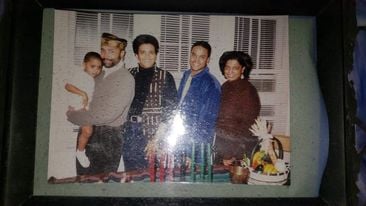Amid rising COVID-19 cases, Evanston’s Kwanzaa celebrations looked different

Photo courtesy of Krissie Harris
Evanston resident Krissie Harris (far right) poses with her Kinara and some family members at a past Kwanzaa celebration. This year, she had to cancel her 30-year tradition in the face of rising COVID-19 cases.
January 4, 2022
For the first time in more than 30 years, Krissie Harris celebrated Kwanzaa without company.
Harris, who grew up in Evanston and resides in the 2nd Ward, previously hosted an annual gathering with nearly 100 friends and family to commemorate Kwanzaa, an annual celebration of African and African American culture taking place from Dec. 26 to Jan. 1. Her guests would pour into her house to sit, laugh and tell stories. Everyone from toddlers to elders shared foods like chicken, spaghetti, greens, cornbread and ham.
Maulana Karenga, the Africana Studies department chair at California State University Long Beach, first introduced the Kwanzaa in 1966 after the Watts Rebellions in Los Angeles inflamed national racial divisions.
The holiday revolves around seven principles: unity, self-determination, collective work, cooperative economics, purpose, creativity and faith. Each principle corresponds to a candle on the Kinara, the seven-branched candelabra used for Kwanzaa celebrations.
During Harris’ annual home celebration, her guests came together to honor their culture by discussing the seven principles, recognizing the deceased, singing the Black National Anthem “Lift Every Voice and Sing” and sitting down for dinner.
Last year, Harris held her celebration virtually with a large Zoom call. She said she intended to host the event in-person this year, but a steep rise in COVID-19 cases mid-December halted her plans. Harris said she was sad to cancel her annual gathering.
Instead, Harris sent out Kwanzaa text messages to her usual guests.
“The spirit of Kwanzaa and its principles are lived out daily by our closest family and friends,” Harris said.
Evanston hosted two events last week to celebrate. On the first day of Kwanzaa, the city hosted a Kinara lighting at Fountain Square and held a virtual festival and storytelling event on Facebook. The livestreamed festival featured a dance troupe, drum circle and poetry reading. Evanston Public Library and the Fleetwood-Jourdain Theatre sponsored both events, which were produced by Tim Rhoze, the theatre’s artistic director.
At the Kinara lighting, the crowd chanted “Harambee,” which means “to pull together” in Swahili.
Chicago resident Cheryl Watkins said she celebrates the holiday to connect with her culture and pay tribute to her ancestors. She typically goes to Kwanzaa events at her church or at the South Shore Cultural Center, she said. However, this year, she only attended Evanston’s virtual event to support her sorority sisters.
Watkins said the traditional colors and patterns of the clothing worn by participants drew her attention, and the dancing and drumming during the livestreamed festival leapt through the screen.
“It captured me,” Watkins said. “It just made me move. I was dancing at home while they were dancing.”
Email: [email protected]
Twitter: @yimingfuu
Related Stories:

